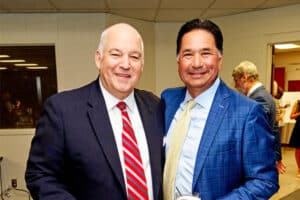By Juliet Linderman, NOLA.com | The Times-Picayune
on September 20, 2013 at 9:51 AM, updated September 20, 2013 at 10:16 AMClick here to read the original article on NOLA.com

Kenneth Polite officially took office Friday morning (Sept. 20) as the Eastern District of Louisianas U.S. attorney, a job that came open for the first time in 11 years after longtime prosecutor Jim Letten resigned amid accusations of prosecutorial misconduct that ultimately led to this weeks stunning ruling in the Danziger Bridge case.
Polite won U.S. Senate confirmation Sept. 17, the same day a federal judge granted a new trial for five police officers convicted in the post-Hurricane Katrina shootings, in a ruling citing “grotesque” misconduct by prosecutors who once held high-level positions in the office Polite now leads.
“People are ready for some permanency, and ready for the cloud to be lifted,” Polite said in his first public interview after confirmation. “To the extent that some of the recent events have led to a downturn in confidence — whether its from the judiciary or from the citizenry — is something my taking office … will help, moving forward and making the work a priority again.”
The office has been without a permanent leader since Letten stepped down in December 2012 after revelations surfaced that two of his top prosecutors posted inappropriate and often inflammatory comments about pending federal matters on NOLA.com. Questions were raised about what Letten knew about the postings and how the revelations were handled internally.
The anonymous online comments, coupled with other instances of misconduct including “coercive tactics” by people in the New Orleans office and elsewhere in the Justice Department, led U.S. District Judge Kurt Engelhardt to grant a new trial for the five ex-New Orleans police officers convicted for their roles in killing two unarmed men and wounding four others on the Danziger Bridge.
Headlines about prosecutorial misconduct were splashed across the front page of the newspaper when Polite sat down for his first interview the day after he was confirmed.
The U.S. Department of Justice declined to comment on the Danziger Bridge ruling, except to say it is reviewing its options, and Polite would not talk about it.
But in an interview at a Garden District cafe, with an FBI spokeswoman at his side and an American flag pin on his lapel, Polite discussed his plans for the office and how he has worked to prepare for the job.
“As someone who has traveled throughout this country and tried to represent this city, I can say the perception of New Orleans as being a place where you must pay to play, and as a place that is quite violent, is very pervasive,” Polite said.
Thats why public corruption and violent crime will remain the offices priorities.
To that end, Polite said he will use proactive strategies to combat public corruption, such as obtaining wiretaps, which he believes have not been used in an Eastern District prosecution since 2000 or 2001. Another priority is cracking down on illegal firearms.
“Theres not much we can do in terms of charging the policy at the state level in terms of our gun laws,” he said, “but I think theres a lot to be done to remove excess numbers of firearms on the streets of Southeast Louisiana.”
A youthful leader
At 37, Polite is the second youngest U.S. attorney appointed by President Barack Obama.
His relative youth has drawn criticism, but Polite sees it as an asset.
“Many young people I meet on the street are very much energized that a person of my age is taking such a leadership role in this community,” he said, “So to the extent that Im able to indirectly help spur other young people to pursue their dreams in life, to take leadership and ownership of the city in terms of making change where appropriate, Im all for it.”
Louisianas Republican Sen. David Vitter had said the office “really needs a more seasoned leader and supervisor.” But Vitter ultimately didnt get in the way of Polites nomination, which was supported by Democratic Sen. Mary Landrieu.
Polite has tried just six cases before juries, and all while a line prosecutor in New York, he reported in his Senate questionnaire in July.
But what he lacks in years in comparison to many hell be supervising, Polite says he can make up for in a diverse range of experiences.
“Many line prosecutors have served exclusively as line prosecutors. They have not served as defense attorneys, they have not served as judicial clerks as I have, or worked in different jurisdictions,” said Polite, who has admission to the bars to practice law in Louisiana, New York and Delaware. “But I certainly dont expect it to be a one-way street. Many of the line prosecutors are outstanding attorneys and even better people; I expect to be learning quite a bit, as a person and as an attorney.”
Polite will have the chance to make key staffing decisions that will set the tone for the office. He said he has not yet made those decisions, such as who will serve as his No. 2. Veteran government lawyer Fred Harper currently occupies that role. He stepped in when Lettens First Assistant U.S. Attorney Jan Mann left office after her role in the online commenting scandal was made public.
Like many U.S. attorneys in the nomination process, Polite spent time meeting with people both in and out of the office. He said in the past 10 months, he sat down with residents, community leaders and law enforcement officials — including all of the sheriffs from the 13 parishes in the Eastern District of Louisiana — and asked them for constructive criticism. He declined to reveal specifics observations offered up during those meetings.
And he said he is planning more outreach.
“I will use this office to reach out to constituents who may not have been reached out to previously,” Polite said.
A New Orleans success story
The path that led Polite to the top prosecutor job in his hometown is a compelling narrative.
He was born at Charity Hospital to teenage parents. Polites mother lived in what was then the Calliope public housing development, and he grew up in the Lower 9th Ward. He graduated as valedictorian of De La Salle High School before attending Harvard University. His law degree is from Georgetown University.
“I had a great upbringing, very humble beginnings, as you can imagine,” he said in a previous interview.
Polites resume is burnished by some of the most elite experiences in the legal profession: He secured a prestigious appeals court clerkship, worked as an associate at global law firm Skadden, Arps, Slate, Meagher and Flom, then did a turn as an assistant U.S. attorney in the Southern District of New York, a district well-regarded for its aggressive white-collar prosecutions. Polite counts as a mentor the current head of that office, Preet Bharara, who has earned a reputation as the “sheriff of Wall Street.”
After starting his career on the East Coast, Polite moved home to New Orleans, with his wife, who is a physician, and two children. For the past three years, he has practiced at Liskow & Lewis, a law firm that occupies the 50th floor of the Shell building, where he was a shareholder focused in white-collar criminal defense.
That defense work means he will be conflicted out of handling certain cases in the U.S. attorneys office. Notably, he represented Hendrikus “Hank” Ton, a boat company owner convicted in a tax fraud scheme connected to the River Birch landfill probe. That investigation, ironically, spurred the lawsuit that unmasked then-Assistant U.S. Attorney Sal Perricone and Manns anonymous posting on NOLA.com, contributing to the office downward spiral.
Polite said a small number of other matters, which are not public because they are at the federal grand jury stage and therefor confidential, would also pose conflicts. The office will create a list of cases from which he will recuse.
Several criminal defense lawyers who regularly go up against Polites office expressed optimism in his appointment.
“Its a refreshing change,” said Buddy Lemann III, a defense attorney and fixture in the federal courthouse. “I look forward to a new day, under a new leader.”
Polites colleagues, past and present, have gushed praise about his intelligence and dedication to the job, as well as his warmth and humility in and out of the courtroom.
“Ken is one of those guys who you meet in your professional life that youre drawn to — hes a natural in court, jurors like him because hes unassuming but competent, and he has a sense of humor and doesnt take himself too seriously,” said Gary Farrell, a Manhattan-based defense attorney who went up against Polite was prosecuting. “Hes everything you want in an adversary. There are a lot of great lawyers out there, and hes something special
“He got a conviction, and I made a friend as a result of my work on that case.”
Office upheaval coupled with budget cuts
While Polite has plans for staffing and instituting new initiatives, change doesnt come easily amid budget cuts.
Sequestration has taken a heavy toll on federal courthouses across the country, and in offices throughout the courthouse, forcing some to consolidate, others to eliminate positions and instate hiring freezes. The U.S. attorneys office is under a hiring freeze, which means Polites ability to bring fresh blood into the ranks may be thwarted.
Polite estimated the New Orleans office has about 10 percent of its lawyer positions vacant.
“Its a difficult time for the entire department – the Eastern District of Louisiana is not unique in struggling with budgetary concerns,” Polite said. “And these offices, and this office, continue to do the work that justice demands. Well figure out a way.”








